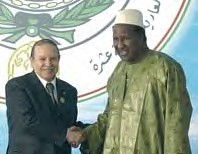
Algerian President Abdelaziz Bouteflika With AU Secretary General Alpha Oumar Konare, Former Malian President
Originally uploaded by Pan-African News Wire Photo File
September 20, 2007
Africa: On the Road to Integration
Statements to Granma from Alpha Oumar Konare, chairperson of the Commission of the African Union.
MIRIELA FERNANDEZ LOZANO
The economic and governance difficulties that hindered the Organization of African Unity (OAU), created in 1963, laid bare the need to reconsider priorities to shape the future direction.
The OAU had met its objectives to free Africa from Apartheid. However, to implement the Lagos Plan of 1980, promoting home grown development, and the Abuja Treaty, proposed in 1991, to create institutions like the African Central Bank, Monetary Unity, a Court of Justice, and a Pan African Parliament, demanded a joining of forces towards integration.
The African Union (AU) was born in 2002 with those goals in mind. "This organization has its own institutions today to build a unified continent. We say no to indifference," said Alpha Oumar Konare, chairperson of the Commission of the AU, during a lecture at the Cuban Ministry of Foreign Affairs in Havana on the current situation in the region.
Konare, who was a UNESCO consultant for the UN Development Program (UNDP) and the President of Mali from 1992 to 2002, said Africa has the largest number of poor in the world, has a high HIV/AIDS rate and a life expectancy of only 47 years, 30 less than in Europe. He noted it is also plagued by armed conflicts, some historic, in diverse African territories.
What is the top priority today for the African Union?
ALPHA OUMAR KONARE: Africa has been very dependent. Among other things the Millennium Goals propose by 2015, free education for the entire population and a reduction in the infant mortality rate. If we don't do something fast it will take a century. I believe we must create conditions for a more transparent and united effort. That's fundamental, and, of course, we need peace and security.
What was the AU reaction to Cuba's demand for greater African presence on the UN Security Council?
ALPHA OUMAR KONARE: I think Africa is also struggling today for its rights and to change the rules imposed by the great powers; if that doesn't happen, poverty will never be defeated and insecurity will become even greater.
Therefore, we need a greater democratization of the United Nations.
The Security Council must be more open, as well as the General Assembly and all the Bretton Woods institutions. That's a demand that ratifies how we share Cuba's struggle.
The signing Monday of a Memorandum of Understanding between the island and the AU, strengthens bilateral ties in the political, economic and cultural arenas and shows that Cuba is taking new steps to be part of the future of Africa.
Konare said that a few months before the anniversary of the historic victory at Cuito Cuanavale, the agreement is an "act of faith in our political will to continue working together in the same spirit of humanism, based on justice and solidarity, as has always been the case between Africa and Cuba."
No comments:
Post a Comment